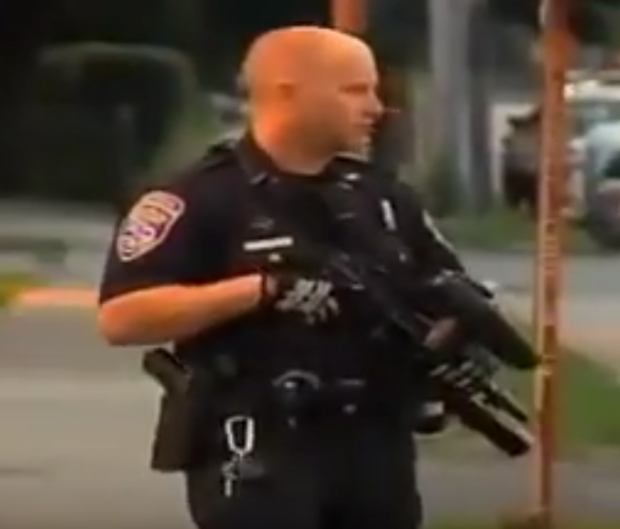What does the term “grenadier” mean to you?
Primary tabs
Submitted by T. Forsyth on Thu, 2016-05-19 13:41
When you hear the term "grenadier," what comes to mind? Is it the photo on the left or the photo on the right?

Seventeenth Century French grenadier soldiers on the left; 21st Century police from St. Paul, MN at the Republican National Convention in 2008 on the right
For me, it was the photo on the left. The image comes from Wikiwand under the search term "Grenadier."
A grenadier, according to Wikipedia, was "originally a specialized soldier, first established as a distinct role in the mid-to-late 17th century, for the throwing of grenades and sometimes assault operations. At that time grenadiers were chosen from the strongest and largest soldiers. By the 18th century, dedicated grenade throwing of this sort was no longer relevant, but grenadiers were still chosen for being the most physically powerful soldiers and would lead assaults in the field of battle."
The image on the right, from the Republican National Convention in St. Paul, MN in 2008, are also grenadiers. The modern assault version.
Why does this matter? As a small group of us were combing over the "BWC [Body Worn Camera] Manual Draft 4.29.2016 Public Release," we came across Section IV., Recording Requirements and Restrictions.
Under the draft Body Worn Camera policy now being proposed by the Rochester Police Department, Section IV., Recording Requirements and Restrictions, subsection E., Special Circumstances, subsection 5 says, "Personnel assigned to Mobile Field Force and Grenadier activities, including protests, demonstrations, and civil disorder situations as defined by G.O 601, All Hazard Plan, will record with assigned BWCs as directed by a supervisor and/or in accordance with an operational directive."
RPD grenadier at 2013 Puerto Rican Festival
Setting aside the Mobile Field Force, we were kind of scratching our heads at the use of the term grenadier. What did that mean? We decided to search for “grenadier” in the General Order Manual from March 2016.
Under the General Order for The Grenadier Team, Section II, subsection A., "The Grenadier Team is a component of the Mobile Field Force (MFF), comprised of selected members who are specially trained to deploy chemical munitions, and to utilize other crowd dispersal technology and techniques (refer to G.O. 605 for further on MFF)."
Police in St. Paul, MN during the 2008 RNC outfitted with crowd dispersal technology and chemical munitions; video from Susan Galloway
So let's recap. The use of the term grenadier doesn't pertain to the image on the left, but rather the one on the right.

Seventeenth Century French grenadier soldiers on the left; 21st Century police from St. Paul, MN at the Republican National Convention in 2008 on the right
Further, this is an assault unit that is "trained to deploy chemical munitions, and to utilize other crowd dispersal technology and techniques," during protected First Amendment activity--protests and demonstrations.
Finally, as the people of Rochester, NY wanted Body Worn Cameras turned on continually as a deterrent to police abuse, it does not bode well that under subsection E., Special Circumstances, First Amendment activities including protests and demonstrations, are NOT required situations for body cameras to be activated but rather can only be activated "as directed by a supervisor and/or in accordance with an operational directive."
And beyond the crowd control situations, three other big issues arise with these policies: 1) police have discretion to turn the cameras on and off at will, 2) there is no consequence for violating BWC policy and no presumption of guilt if the camera is off when it should have been on, and 3) while police are supposed to have their cameras on when investigating civilian crimes, they are prohibited from turning them on in cases where Profession Standards Section (PSS) is conducting investigations into complaints of police misconduct.
What started as a question as to what a grenadier was in the current police terminology, was quickly recognized to be police discretion in situations that can explicitly and quickly lead to police overreaction, violence, and abuse of power.
This is not acceptable. We need a policy that will actually hold police accountable--not give them more tools to oppress and more power to dominate.
On a last note, this document is a draft and not the final policy. Things are not set in stone as of yet. There is still time to apply pressure to your city councilor and the mayor and demand police accountability with the BWC policies.
Related: Police reform group makes policy recs to city for body cameras | Coalition praises council on body cameras; demands a voice in policy decisions
Read the Rochester Police Department's BWC [Body Worn Camera] Manual Draft 4.29.2016 Public Release below:










